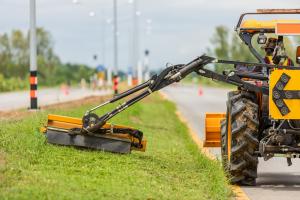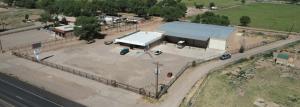— John Michael Morrow, Jr.
OPELOUSAS, LA, UNITED STATES, September 20, 2024 /EINPresswire.com/ — Agricultural equipment on Louisiana’s roads can create unique traffic challenges that increase the risk of accidents. In rural areas, where slow-moving farm machinery often shares the road with faster vehicles, accidents are not uncommon. John Michael Morrow, Jr. of Morrow Law Firm in Opelousas, Louisiana, provides insight into the legal complexities surrounding these incidents. The firm, led by William P. Morrow, John Michael Morrow, Jr., and Stephen M. Morrow, regularly deals with legal matters involving workplace injuries and related accident claims.
Farmers in Louisiana depend on the use of large, slow-moving equipment to carry out their daily operations. Tractors, harvesters, and other agricultural machinery are frequently driven on rural roads, often during busy harvest seasons. While necessary for the state’s agricultural economy, the presence of this equipment on public roads can create significant hazards for other motorists. Understanding the risks and legal responsibilities in these situations is crucial for both farmers and drivers.
Agricultural Equipment and Road Safety Challenges
Slow-moving agricultural equipment is typically not designed to keep up with the speed of other vehicles on the road. As a result, accidents can occur when faster-moving vehicles approach farm machinery too quickly. Drivers may underestimate the slow speed of the equipment or misjudge the time needed to pass safely, leading to collisions.
One of the main challenges is visibility. Agricultural equipment is often large, but it is not always easy to see, especially on narrow, rural roads with limited lighting. Many of these machines lack proper lighting or reflective materials, making them difficult to spot during early morning or late evening hours. Additionally, equipment with wide attachments can extend into adjoining lanes of traffic, increasing the potential for sideswipe accidents.
“Many accidents involving farm machinery occur when drivers fail to recognize the equipment’s slow-moving nature until it’s too late,” explains John Michael Morrow, Jr. The nature of these collisions can lead to severe injuries, especially when smaller vehicles collide with large, heavy machinery.
Legal Responsibilities of Farmers and Drivers
In Louisiana, the law requires that slow-moving vehicles display a specific emblem—a bright orange triangle with red reflective borders—on the rear of any vehicle moving at speeds below 25 miles per hour. This emblem is designed to alert other drivers to the presence of slow-moving equipment and to encourage caution. Additionally, Louisiana law requires that farm equipment on public roads be properly lit between sunset and sunrise or in conditions where visibility is reduced.
Farmers and operators of agricultural equipment have a responsibility to ensure their machinery is properly marked and lit. They must also follow traffic laws, including driving as close to the right side of the road as possible to allow other vehicles to pass safely. Failing to meet these legal requirements can result in liability if an accident occurs.
On the other hand, motorists also have a responsibility to exercise caution when driving near slow-moving vehicles. Louisiana law requires drivers to reduce speed and proceed carefully when approaching farm equipment. Drivers must also observe proper passing procedures and allow for ample space to avoid collisions.
In accidents involving agricultural equipment, determining liability often hinges on whether both parties adhered to these legal obligations. Farmers can be held liable if their equipment was not properly marked, lit, or operated in accordance with the law. Conversely, drivers may bear responsibility if they were speeding, passing unsafely, or not paying attention to road conditions.
Liability in Accidents Involving Agricultural Equipment
Accidents involving farm equipment often lead to complicated liability disputes. Multiple factors must be considered, including the condition of the equipment, the actions of both drivers, and the specific circumstances of the accident.
Farmers who fail to properly maintain their equipment or neglect to mark their machinery with the required emblems may be found liable for accidents. For example, if a tractor lacks the appropriate slow-moving vehicle sign or has broken lights, the farmer could be held responsible for any collision that occurs as a result of reduced visibility.
Additionally, if the equipment extends into another lane of traffic without warning or is operated in a manner that obstructs the flow of traffic, liability could also fall on the farmer. In these cases, legal claims may be brought against the farm owner or the operator of the equipment for negligence.
However, drivers also play a role in preventing these accidents. If a motorist is found to have been driving recklessly, speeding, or attempting to pass the agricultural equipment in an unsafe manner, they may share liability for the accident. Louisiana’s comparative fault laws allow for fault to be divided among parties, meaning both the farmer and the driver could be held partially responsible for the accident.
“Accidents involving agricultural equipment often require a detailed investigation to determine who is at fault,” notes Morrow. Understanding the roles and responsibilities of both farmers and drivers is key to resolving these cases fairly.
Injuries and Legal Recourse
Accidents involving agricultural equipment can result in severe injuries, given the size and weight of the machinery involved. Common injuries include broken bones, head trauma, and even fatalities in more serious cases. For victims of these accidents, pursuing legal action may be necessary to recover compensation for medical expenses, lost wages, and other damages.
In Louisiana, individuals injured in accidents involving farm equipment have the right to seek compensation if the accident was caused by negligence. This may involve filing a personal injury claim against the farmer, equipment operator, or even a third party, depending on the circumstances of the accident.
Farmers and operators may also need legal representation if they are facing claims of liability or negligence. These cases often involve negotiations with insurance companies, legal documentation, and potentially going to court to resolve disputes.
Conclusion
Accidents involving agricultural equipment on Louisiana’s roads are a growing concern, particularly in rural areas where farm machinery frequently shares the road with faster-moving vehicles. Understanding the legal responsibilities of both farmers and drivers is essential in preventing these accidents and ensuring accountability when they occur.
Morgan Thomas
Rhino Digital, LLC
+1 504-875-5036
email us here
Visit us on social media:
Facebook
Legal Disclaimer:
EIN Presswire provides this news content “as is” without warranty of any kind. We do not accept any responsibility or liability
for the accuracy, content, images, videos, licenses, completeness, legality, or reliability of the information contained in this
article. If you have any complaints or copyright issues related to this article, kindly contact the author above.
![]()
Originally published at https://www.einpresswire.com/article/745128687/how-louisiana-s-agricultural-equipment-on-roads-contributes-to-accident-risks-legal-insights





